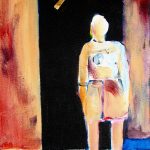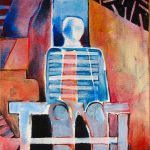Joe and I make refried beans on a Saturday morning while our four-month-old sits in a bouncer and gums his hands. We follow the recipe I’ve learned by watching my mom for years: heat oil in a deep pan, fold each white corn tortilla into four triangles, and toast them in the oil until they are brown and crisp. Joe always reminds me to flip the tortillas and remove them just when they are crispy, not a second later. I’ve burned dozens of tortillas in our two years of marriage, their pockmarked surfaces forming black bubbles. It’s always because I’m in a hurry, turning the heat up too high, or because I’m trying to get something else done at the same time—fry the rice, chop the cilantro. I return to smoking oil and charred chips. I’ve learned that the secret to this meal of refried beans, as with most Mexican food, is taking your time and giving it your attention.
—
When my parents were dating, my dad told my mom he had always wanted to marry a woman who cooked as good as his mom. They were sharing a meal my mom had made for him after a long day of work.
“You better be careful,” Mom said. “Someone might mistake that as a proposal.”
Dad, the story goes, blushed. “You never know—it might have been.”
Returning the jest, Mom smiled casually. “Well, you never know I might have said yes.”
Later that evening, he proposed to her on the San Antonio River Walk. He had no ring, no plan, really. I believe it was the only spur-of-the-moment decision he ever made in his adult life—my father the planner, the deliberator, the one I’m said to take after in my notorious cynicism.
I try to imagine what it was that overpowered him that day he proposed to Mom: love that disregarded fear and obstacles, a love effusive and daring, the kind of emotion I’ve rarely seen my practical, serious father express in words. A midwestern farm boy, he wasn’t raised to express feelings that way. Sometimes, when I think of Dad as a young man falling in love over food, I think also of the little boy finding comfort—love, safety, and home—in his mother’s cooking. I imagine meals were often my stoic grandmother’s only means of showing tenderness to her children. To say he wanted to marry a woman who cooked as good as his mom was to say he wanted a woman to share a home with.
On a Sunday morning, when I was having brunch at my parents’ house, Dad told me that beans and hot sauce have replaced mashed potatoes and gravy in his diet. I laughed, because I know how much Dad loves mashed potatoes and how much Mom hates them. She didn’t grow up with them and finds their texture unappetizing. I think of how Dad—born in Chicago, raised on a farm in Iowa—never ate a breakfast taco until he met Mom, born in Guadalajara and raised in San Antonio. Now he eats chorizo, eggs, beans, and jalapenos every morning for breakfast.
—
After I remove the tortilla chips, we let the oil cool a few minutes. I learned the need for this the hard way, too, from the time I poured an entire can of beans into the bubbling oil and ended up with a sprinkle of burns across my arm. When I told Mom, she scolded me in that strange way we get mad at people we love for hurting themselves.
“You have to wait,” she told me, a step I hadn’t remembered ever seeing her take. I simply assumed she’d learned the art of pouring beans into scalding oil without burning herself.
I’ve since made it Joe’s job to pour the beans into the pan, regardless of how cooled the oil is. This morning, we use a fifty-three-ounce can of Bush’s Pinto Beans, with their liquid. Joe and I joke that we have a problem, making too much for only two people.
“It was the smallest can I could find,” I say, but Joe is happy we’ll have leftovers for tacos later in the week.
—
Mom has used Bush’s for as long as I can remember, though she talks of a time she used to wash and boil her own beans.
“It takes too long,” she says now, “and Bush’s taste just as good.” On the rare occasions she makes frijoles borrachos, I’ve seen just how long it takes to prepare beans from scratch. She lays them out on a towel, their speckly, wiggly forms smooth as she runs her fingers over each one, feeling for bumps and sprouts. She throws out the misshapen ones, rearranges the remaining ones. Then she lets the beans soak in a cold-water bath overnight before boiling them until they’re soft, like butter, then adds tomatoes, cilantro, bacon, and a bottle of Corona beer to the broth. I asked her once if the bumpy beans are bad to eat.
“No,” she said. “I just want the pretty ones.”
She told me once that her dad, my Tito, used to carry out this bean ritual weekly, often recruiting her from backyard play or homework to help. She says there was always a pot of beans on the stove in her childhood home. Her family ate beans and rice almost every day.
“We were poor,” Mom says, which is a statement I realize I can’t understand, not the way she does. Beans and rice have never been the main dish at a family dinner I can remember. My grandparents both owned their own businesses, trades brought over from Mexico. My Tito was, and is, a shoe repairman; my Tita, a seamstress and a sculptor. But with five children, a language barrier, and dying trades, there were times when their hard work barely paid the bills. If they came to this country with the usual hopes of immigrants, their grandchildren even more than their children are the ones who have seen those hopes to fruition.
I think of the disparity between their lives and mine, of how much of who I am I’ve inherited from them and the world they came from. Some of those things are simple: the shape of my eyes, my ability to roll my “r’s,” my love for their simple, delicious food. Some of those things are more complex, specific to Mom’s family: a history of brokenness, abuse, and betrayal; a propensity for the dramatic, for storytelling. And yet, though I claim my Latina heritage, I only really know that world through Mom’s stories and recipes.
—
As Joe fries onions and corn tortillas for migas, another dish I’ve learned from Mom, I wait for the beans to heat back up. I watch as they turn frothy and bubbling, then take a potato masher and smash them into their broth. Once, Joe tried to mash them before they started to boil, and the masher made awkward chunks of the still too-hard beans. We learned that you have to wait until they’re soft, so that when you’re done smashing, the beans look almost like gravy.
I heat flour tortillas as I wait for the beans to cook. Joe laughs when I insist that the first tortilla, hot off the pan, go to testing the beans. It’s Mom’s tradition: standing in front of the hot stove, tortillas on a cast iron skillet, she’d rip the edge of one—her fingers moving quickly—and scoop the beans in their broth and hand it to me to taste. If it was too hot in my mouth, we knew they were ready. I do the same for Joe now, and he fits the whole piece of tortilla in his mouth in one bite.
“So good,” he says, and I smile, because he never ate refried beans for breakfast until he met me.
—
Mom tells me that, when I was born, she and Dad couldn’t afford to take pictures of me. With two children and Dad in grad school, film was an expense they couldn’t spare. Meanwhile, I scroll through the hundreds of pictures I’ve taken of my son on my iPhone, every snap as effortless and cheap as a can of beans.
I don’t remember those seasons of hardship, the years of hand-me-downs and one family car, when dinner at the Kentucky Fried Chicken counted as my parents’ date night. But I know their toll. I remember, even when we could afford new cars and a custom-built home, the nights when family dinners were disrupted by arguments so bitter they turned the food cold on our plates. Dad’s anger that Mom couldn’t keep to a budget. The stress of a job that kept him away on nights and weekends. The time his anger was so violent that he sent his fist into the drywall, and my brothers and I cried as a pot of Mexican rice sat untouched on the kitchen table. The time I asked Mom why they didn’t think their fighting hurt my brothers and me. If only I knew then how much she already knew that it did.
Years later, at my wedding, Dad whispered to me, “I pray Joseph is a better husband to you than I’ve been to your mom.” He was crying, that rare expressiveness surfacing, a vulnerability that told me that he knew, too, that my brothers and I felt the weight of his spousal mistakes, that we would carry them into our own marriages and families.
—
Joe asks if I want anything else with breakfast, and I add a handful of strawberries to the table of fried, Mexican food.
“Are you really going to eat those?” he asks, not because there’s anything wrong with the strawberries, but because I’m notorious for taking out strawberries and not eating them, leaving them to turn crusty and brown in a ceramic bowl all day.
“Yes,” I say, which will become a lie. The strawberries are there to make me feel healthy, though I will feel guilty later when I throw them away. Joe, who was not raised to calculate the cost of every item of wasted food, accepts my habit with patience.
Some weeks later, when he leaves a pot roast out overnight, forgetting to cover it and put it in the fridge, I’m the one who can’t contain her anger, refusing to speak to him for half the day. Because the roast was expensive, time consuming, the time and the money we don’t have now with a baby. It’s only the sight of him bouncing our son, making him laugh, that reminds me of all the times I wished my parents had weighed their marriage against their anger. A pot roast is pretty light in the scale.
—
When Mom got breast cancer six years ago, Dad blamed it on food, on the milk from cows treated with hormones, on the grill her parents didn’t scrape clean of charcoal carcinogens. He began to research with all the zeal of the academic he had been before three kids. Diet, he decided, was at the heart of health. He told Mom to buy organic, unprocessed food. He decided to turn the hobby farm he’d had since we were kids into a business, even though raising pigs and cows and chickens is exhausting in any climate, but especially in the heat of Texas summers.
Now, he sells farm-raised beef, pastured pork, and free-range eggs in an effort to teach people about sustainable farming and healthy living. But I know the deeper reason, even if he won’t say it, even if his fear for Mom turns into scolding when she doesn’t drink bone broth or cook with the right oils. I know there is love, duty, vigilance, even in his anger.
When I was pregnant, he told me I shouldn’t eat corn flakes because they might be tainted with Roundup. I started crying. Hormones aside, my tears were the realization of how deep his fear went. Food has become protection from cancer, from diseases without known cause. Food is how he can protect his family. When he and Mom tell us to read ingredients, to make baby food from scratch, Joe and I complain that they’re being paranoid. We remind them that we can’t afford to buy all organic food. But we also know that food has become their shelter against things beyond their control. We can’t blame them for wanting to build it over us.
—
Joe and I eat the entire pan of migas and nearly half of the beans; we serve them with a side of Herdez green salsa. I like to remind Joe that I know something about Mexican cuisine, especially when we go to his family’s house for dinners and they serve things like pre-packaged guacamole and cold tortillas. But there is always the part of me that feels like an imposter, like I’m trying to claim something that barely is mine. I use canned beans and store-bought tortillas. If Mom does the same, it’s because she’s trying to save time, and not because she doesn’t know how to make them from scratch. Still, there are dishes she won’t make because she says my Tito makes them better.
“Plus, they take way too long,” she says, and I can’t tell if that’s the real reason or the excuse for why I’ve never had her tamales or her menudo. I’ve never made salsa, or chile relleno, or mole from her recipes for the same reasons, and because of the part of me that feels those recipes aren’t mine to make. It is the same feeling that washes over me when I hear someone speaking in Spanish, those sounds and syllables that echoed through my childhood when Mom spoke over the phone to her parents or when she drilled me on conjugation and tense, lessons I can barely recall. I can’t speak Spanish, and yet its cadence feels like home. Like a home I’ve inherited, but I can’t find the key.
When people ask me why I can’t speak Spanish, I usually blame my parents: Mom didn’t speak it often enough at home because Dad couldn’t understand it. But if I’m honest, I know that I was the one who stopped practicing, who was too embarrassed by an accent that didn’t flow as smoothly as my mother’s. When it comes to my Mexican heritage, is it only half-known because Mom didn’t share enough with me, or because I am too afraid to enter the discomfort of my unknowing?
—
After our son was born, Mom drove the five hours to visit us twice over three weeks. She brought meat from Dad’s freezers and filled ours with meals from my childhood. Enchiladas, taco meat, Mexican rice. She spent all day cooking or holding our son while we napped or took short walks, tried to regain a semblance of normalcy in those first, volatile weeks.
I don’t remember very much from those sleep-deprived days, except for this feeling that everything was on the verge of breaking. My body. This tiny, hungry person who needed me constantly. Everything about life that Joe and I knew before he came. Everyone talks about the joy of newborns. Few talk about the fear—of failing, of death—that comes with them.
But when Mom was there, I felt my fears recede, a sense of reassurance in her cooking and her smile. The sense that the walls of our little apartment would hold up through all the sleepless nights and the strange, repetitive days filled with nothing and everything. Wrestling squirming legs into infant diapers, staring at the rise and fall of his chest as though all our lungs were encased by that tiny rib cage. And even when Mom left and we sat at our table with the reheated food she’d made for us, there was a wholeness created by a family dinner, a comfort in tastes we knew.
—
As we finish breakfast, our son begins to fuss, so Joe picks him up and sits him on his lap, lets him sit at the table and look at the empty plates and thickening beans.
“In a few months, you can try these,” I tell him as I scrape the spoon across the pan, because I know that beans were among my own first tries at solid foods. I wonder to myself if he’ll like them, because I know that both of my brothers aren’t fans of the dish. I wonder if doctors recommend feeding babies beans, or if it’s one of those things my parents did that experts now swear have a hundred health risks, like giving your baby a stuffed animal to sleep with or using baby sunblock. I decide I’ll follow Mom’s example with this one. Our son sticks his tongue out when he smiles, and I notice again that his eyes are Joe’s, but his nose is like mine.









